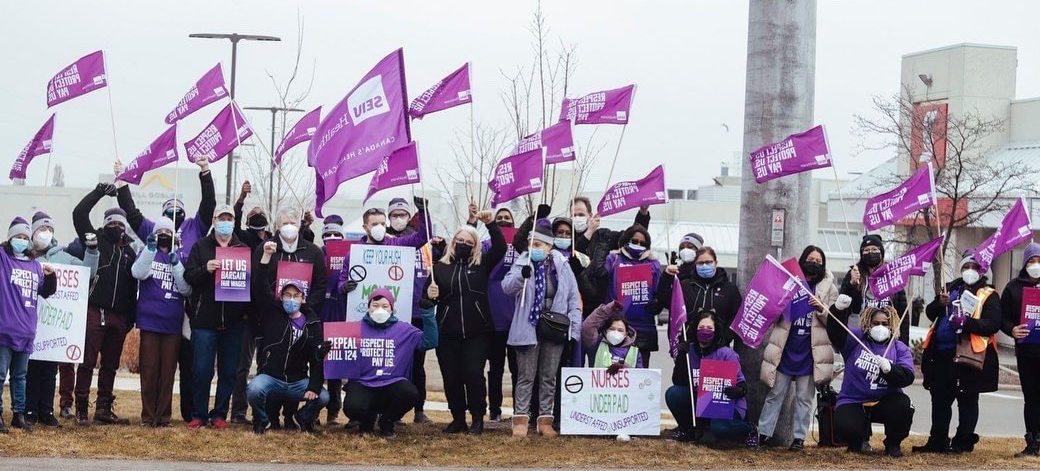In the News April 18
Human-Centred Solutions Are Urgently Required
Ontario Workers Demand Repeal of Anti-Social Legislation

Health care workers across Ontario are continuing their fight for wages and working conditions acceptable to the workers and for the government to get serious about recruitment and retention of nurses, personal support workers and health care workers in all occupations. Between March 14 and 23 pickets were held at Conservative MPPs office in all corners of the province and on February 22 workers delivered thousands of postcards to Queen’s Park calling on the Ford government to repeal Bill 124 so that workers can negotiate based on their demands. Regional rallies are scheduled for May 5, 6, 9, 10 and 11 in Toronto, Oshawa, Ottawa, Sudbury and Hamilton as bargaining continues for 95,000 workers represented by the Ontario Council of Hospital Unions – CUPE (OCHU), Service Employees International Union (SEIU)-Healthcare and Unifor.
For over a year, since its launch on International Women’s Day 2021, these unions and the Ontario Nurses Association, altogether representing 175,000 health care workers, have carried out a “Respect Us. Protect Us. Pay Us.” campaign. In actions across the province, in media ads and through social media, workers have informed the public of their conditions and their demands, including full-time jobs with benefits in the place of precarious part-time jobs, personal protective equipment (PPE) needed to keep workers, patients and residents safe, and improvements in wages and working conditions that are needed to provide workers with safety and security on the job.
The government’s anti-worker Bill 124 which applies to health care workers and many other public sector workers imposes a cap on compensation increases of one per cent per year for three years. When inflation is taken into account a wage increase of one per cent would represent an actual decrease of about four per cent. The cap has more far-reaching impact because the one per cent covers not only wages but everything considered a benefit. For instance, workers need more access to mental health counselling due to the pandemic but are blocked from negotiating any benefit improvements.

The past two years of the pandemic have exposed the crisis in health care. After three decades of cuts and privatization the health care system was not able to cope with the increased demands of the pandemic. Instead of taking immediate action to train more workers and to ensure that workers were provided with PPE and other supports and to implement solutions put forward by the workers, the Ford government invoked Emergency measures that allowed employers to violate collective agreement provisions on work schedules and assignments, creating chaos. Put in an untenable situation, many health care workers have left their jobs. For nurses alone, there were nearly 9,000 vacant nursing positions by the middle of 2021. Hospital beds across the province are empty, not because of COVID-19 or that there are not patients who need them, but due to lack of staff.
The solution to the health care crisis in Ontario starts with meeting the demands of health care workers for wages and working conditions that they need to be able to carry out their responsibilities to the people of Ontario.

Workers’ Forum, posted April 18, 2022.

|

|
[BACK]

